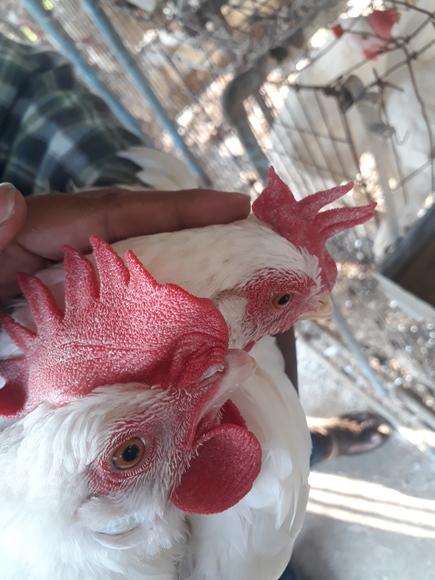Explore all the information on
Metabolic and nutritional diseases in poultry
Deficiencies or disturbances of nutrition cause a variety of diseases and can arise in different ways. The amount of a particular nutrient in the diet may be insufficient to meet the requirements, the diet may contain substances that inactivate the nutrient or inhibit its absorption/utilisation, or metabolism may be upset by the interaction of dietary and environmental factors. Peroxidation of lipids or oxygen free radical generation in general is a physiological process important for cell metabolism, division and differentiation and also for the biosynthesis of hormones and prostaglandins. Several common health conditions can affect poultry, including visceral gout, fatty liver syndrome, cloacal prolapse, osteomalacia, vitamin E deficiency, and ascites syndrome. Understanding these conditions and implementing appropriate management strategies can help prevent and treat them effectively.
We have a layer poultry farm here in the philippines. 2 bldg. with a population of 9,400/bldg. The breed is lohman white. Age is between 20 - 28 weeks old with a production of 70% and 90%. The problem is our mortality is ranging from 10 - 15 heads per building per day. primary cause of death is prolapse and egg bound. we fed them with a high enery feeds, does the high energy feeds contributes to our chicken prolapse? Temperature is around 28 to 30degree celcius....
Comments : 30
Recommendations: 0
INTRODUCTION Vitamin D is a group of closely related compounds that have antirachitic activity. It has been estimated that nearly 50% of the United States population is at risk for vitamin D deficiency or insufficiency (Holick et al., 2011). Vitamin D 3 (D 3 ) deficiency can cause rickets in young children or increase the risk of osteoporosis and osteomalacia in adults (Holick, 2005). One approach to increase D 3 intake in a population without...
Comments : 0
Recommendations: 1
I. INTRODUCTION The rise in incidence of myopathies in young broilers over the past few years has resulted in the industry looking for solutions to reduce and/or eliminate their effects in the poultry flock. The main three myopathies of concern are the so-called white striping (WS - parallel white stripes on the surface of the broiler’s pectoralis muscle), woody breast (WB - accumulation of connective tissue fibres and fat cells in the inner...
Comments : 0
Recommendations: 0
This newsletter provides an overview of the anatomy of the keel bone, risk factors and welfare implications associated with keel fractures, how to assess keel bone integrity, and management strategies to mitigate keel fractures in laying hens. ...
Comments : 0
Recommendations: 0


The Role of Amino Acids in the Immune System – A special focus on broilers.
Suggested link
Leg problems are among the top health concerns of poultry raised for meat. Leg problems influence poultry at all stages of production, lead to reduced productivity and contribute to mortality. Leg problems have many different causes and contributing factors, including...
Comments : 1
Recommendations: 0
Wooden breast (WB) is a degenerative myopathy seen in modern broiler birds resulting in quality downgrade of breast fillets. Affected filets show increased toughness both before as well as after cooking and have decreased water holding capacity and marinade pick up compared to normal fillets. Although the exact etiology is unknown, the circulatory insufficiency and increased oxidative stress in the breast muscles of modern broiler birds could be resulting in damage and...
Comments : 0
Recommendations: 0
Poultry Immunity The poultry immune system is in many ways the “standard” vertebrate immune system, which is what makes it such a good model for immune research, though there are several key differences when compared to other agricultural species. Indeed, much of our fundamental understanding of immunology has come from the study of poultry, specifically chickens. Discoveries including retroviruses, oncogenes, interferon, vaccine...
Comments : 1
Recommendations: 1
A complete recovery of the liver function is necessary to get back to the productive standards The liver is one of the main points of the organism, as it is in charge of multiple essential functions such as protein synthesis , essential for the production...
Comments : 0
Recommendations: 1
.jpg&w=3840&q=75)

Best Practices for Sustainable Waste Management and Environmental Solutions
Suggested link
Species Rickets and nutritionally based bone problems occur very frequently in backyard and specialty types of birds. All birds, particularly fast growing birds fed "home-formulated" diets may be affected. Status in Canada Nutritional bone problems occur commonly any bird species fed diets other than...
Comments : 9
Recommendations: 3
The liver is a key organ for the health and productivity of poultry and plays a significant part in the digestion, metabolism and utilization of nutrients. The incidence of fatty liver disease increases during the hot season. Experimentally, it has been demonstrated that broilers exposed to heat stress for two weeks show a higher concentration of triglycerides and enzymes related to lipid synthesis in their livers and that after three weeks their liver cells suffer from fatty...
Comments : 0
Recommendations: 0
Producing high quality meat is a primary goal of the poultry industry. In the recent years, as chicken breeds are genetically selected for faster growth and larger breast meat, there has been an increase of myopathies (diseases of the muscle in which the muscle fibers do not function properly) mainly...
Comments : 0
Recommendations: 3
The liver is a key organ for the health and productivity of poultry and plays a significant part in the digestion, metabolism and utilization of nutrients. The liver is involved in the metabolism of fats, carbohydrates and proteins; it is the main storage site for fat-soluble vitamins (A, D, E and K), the...
Comments : 0
Recommendations: 2
Wooden breast (WB) is a degenerative myopathy seen in modern broiler birds resulting in quality downgrade of breast fillets. Affected filets show increased toughness both before as well as after cooking and have decreased water holding capacity and marinade pick up compared to normal fillets. ...
Comments : 0
Recommendations: 0
Osteoporosis in laying hens is of health, welfare, and economic concern. During the onset of lay, hens rapidly build up the amount of medullary bone which has less structural integrity instead of structural bone formation (Whitehead, 2004). However, freedom of movement in cage free systems can stimulate structural bone formation to avoid mechanical failure which may improve bone health at the end of laying period. The aim of this study was to compare the ultrastructure features in laying hen...
Comments : 0
Recommendations: 0
The term cage layer fatigue was initially used in North America (Couch, 1955) to describe a leg weakness in high producing hens housed in cages. Caged layer fatigue (CLF) seems to be an extreme consequence of loss of structural bone in the vertebrae that leads to spinal bone collapse and paralysis...
Comments : 4
Recommendations: 2
1. Introduction The world’s chicken meat production has grown markedly in the last few decades, with a 3% increase estimated for 2020 in relation to the 95.5 million tons produced in the year 2019 [1]. Today’s successful production and exports of chicken meat are a result of measures adopted by the poultry industry, with high growth rates, minor feed conversion ratios and elevated meat production [2] that meet the market demands. However, problems that compromise the...
Comments : 0
Recommendations: 0
Combs, wattles and earlobes that are rich and glossy in colour, and have increased in size, indicates a healthy, laying hen. On the other hand, a hen displaying short, pale and hard combs and wattles signifies they are not in lay. ...
Comments : 1
Recommendations: 0
Oral lesions in chickens can be caused by trichothecene mycotoxins (for example T2) but there are other causes including any contact toxins (CuSO4), excessive CuSO4 and physically rough forms of particulate Calcium. Mycotoxin binder salesmen regard oral lesions as pathognomic for lack of mycotoxin binder in the feed and diagnosticians always worry that a negative mycotoxin assay is a sampling artefact. This case study made me realize that oral lesions are not always associated with...
Comments : 0
Recommendations: 0
FAYETTEVILLE, Ark. – For 21 years, the main thrust of Casey Owens' research has been improving meat quality for the poultry industry. Which is good.
Because during that time, the poultry industry has...
Comments : 0
Recommendations: 0
Introduction Nigerian Agricultural sector is identified with the provision of food and nutrition while poultry production is responsible for 19% of the meat supply (SAGTAP, 2012). The value of the commercial poultry industry in Nigeria is estimated at N80 billion ($600 million) and is rated as the most industrialized component of the livestock Sub-sector. Over 25 million people are employed directly and indirectly in the...
Comments : 5
Recommendations: 0
















.jpg&w=3840&q=75)







.jpg&w=3840&q=75)




.jpg&w=3840&q=75)









